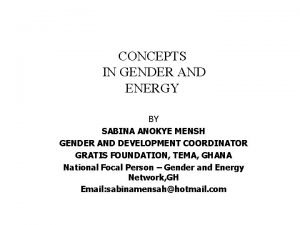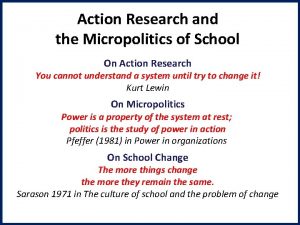Affects and aggregations the uneasy micropolitics of gender






















- Slides: 22

Affects and aggregations: the uneasy micropolitics of gender research Nick J Fox University of Sheffield

An uneasy pursuit? • Gender is conventionally regarded as constructed. • Gender realism remains a presence: ‒ ‒ in lay discourses; in policy; in some studies of social divisions and inequalities; in some activism. • Biological sex as a factor in gendered (and binary) naming practices and identity ascription. • Intersectionality theories. • Non-binary theories of gender.

The linguistic turn • Rejection of gender essentialism and gender/sex link. • Female and male bodies materialised through discourse. • Discourses reveal the workings of patriarchy, gender inequality. • Power/knowledge: formation and governance of gendered identities and subjectivities. • Criticism: focus upon language and textuality at expense of bodies.

The turn to matter • • • Focus upon matter and its contextual capacities. What bodies can do, not what they are. Human agency no longer privileged over nonhuman material forces (‘affects’). Thoughts, memories, desires, emotions have material effects. Material forces act locally. The materiality of sociology itself. Fox NJ and Alldred P (2016) Sociology and the New Materialism. London: Sage.

The materiality of gender • Shift from gender as socially constructed to socially produced and productive. • Gender is a capacity. • Gender is affective: it affects and is affected. • Gender is productive. • Gender is a becoming not a state. • We need to research gender as a capacity, how it is produced and what it produces.

Gender as aggregation • Sociology has often reflected societal understandings of gender (e. g. essential, binary). • Reflected in stratification theories. • New materialism: class, gender, race are not stratifications that divide, but aggregations (Lorraine, 2008). • Not two (or four or 71) genders, but ‘a thousand tiny sexes’ and ‘a thousand tiny intersections’. • There as many ‘genders’ as there are events.

The micropolitics of gender • A materialist approach to researching gender would: ‒ Explore events (assemblages) rather than bodies or identities. ‒ Study the economies that link human and/or nonhuman relations in these events. ‒ Identify the capacities produced by these economies of affect. ‒ From these, deduce the micropolitical effects that produce ‘gender’ and gendered effects.

Gender, materialism, research 1 • Karen Barad (2007): ‒ Applies quantum mechanics to social research. ‒ Not entities but phenomena ‒ Intra-actions between matter and observers. ‒ Onto-epistemology: every observation is a ‘cut’ that affects what is included and what is excluded. ‒ ‘Diffractive methodologies’ make these contextdependent cuts explicit.

Gender, materialism, research 2 • Deleuze and Guattari (1988): ‒ ‘Royal science’: a ‘reproducing’ micropolitics. Examples: deduction, induction. ‒ ‘Minor science’: typified by ‘following’. Examples: exploratory research, case studies. • Both Royal and minor approaches have value. • Gender research will benefit from drawing upon both minor and Royal science approaches.

Gender, materialism, research 3 • Fox and Alldred (2014, 2015): a materialist micropolitics of research. • Focuses upon events and the ‘event-assemblage’. • Research is itself an event: a researchassemblage. • Micropolitics between event-assemblages and the research-assemblage. • Forward-engineer research to produce specific micropolitical effects.

The event-assemblage • Every ‘event’ to be researched is an assemblage of relations: bodies, things , social formations and ideas. • The aim of materialist research is to explore: • how relations affect and are affected within assemblages. • the capacities produced by the assemblage, (not attributes of bodies or things). • The micropolitics of the assemblage.

A gender-event example • Fjaer et al (2015): a ‘Hook-up assemblage’ young women - alcohol – graduation parties – music – dancing – ‘pine-cone’ (symbol of intercourse) – vans/buses – gendered moral codes/standards – sexual partners – outdoor spaces – social media • Affects in this assemblage produce intoxication, sexual hook-ups, gendered judgements, emotions, gender roles. • Micropolitics: the hook-up assemblage enables sexual liberality but sustains gendered roles and double standards of sexual behaviour.

The research-assemblage • Research can be understood as an assemblage. research tools and methods – researcher - audience - philosophy of science – previous research – research contexts – ethics – local research culture – etc. Inquiry. • These relations affect and are affected, producing the micropolitics of social inquiry. • The RA’s affects and micropolitics can be analysed, to understand how it works.

Research micropolitics • During research, event-assemblage and research-assemblage ‘hybridise’ to create a new composite assemblage. • If the affects in the research-assemblage are very powerful, they may overwhelm the event affects, creating the event in the research’s image. • If the RA affects are weak, the research insights will be superficial , uncritical or journalistic. • The challenge is to negotiate a path between these extremes.

Reverse engineering research • The affect economies of research-assemblages are relatively simple and can easily be reverse engineered to explore their affect economies and micropolitics. • Assemblage micropolitics: the intended and unintended products in terms of power and control e. g. researcher over researched. • A research design can be seen as a series of research machines (sampling, collection, analysis) that are plugged together. Each machine has its own micropolitics.

Research machines • Machines of research, each with its own affect economy: • Research question • Sampling • Validity and Reliability • Data Collection • Data Analysis • Reporting and Dissemination • and many more. . . • Machines can be assembled to produce research designs.

Analysis of a research machine • Questionnaire used to survey attitudes to female politicians • What is does: scores respondents on selected measures. • Affects: 1. Questionnaire construction: transforms variables to be measured into a question. 2. Questionnaire administration: asks a question, records answer and allocates it to a pre-coded category, for each respondent. • Micropolitically, this machine imposes a researcher’s categories and choice of measures upon events.

The aggregations of research • Analysis of methods, techniques and designs reveals that almost all are aggregative. • This has the micropolitical effect of producing regularity, similarity and continuity in research accounts of events, often excluding anomalies or diversity. • Some designs (e. g. RCT, survey) are more aggregating than others (e. g. ethnography, case study). • It is possible to identify all aggregations and recognise the effects they have on the data.

Forward-engineering the RA • Re-design research to reduce or control aggregations: ‒ a) Remove as many aggregating affects as possible. ‒ b) Account for aggregations and consider them when assessing the findings of a study. ‒ c) Mix highly aggregating (e. g. trial, survey) and less aggregative (e. g. observation, case study). • This rehabilitates a range of research methods, and provides support for mixing methods/designs.

Materialist gender research • Analyse social, cultural, biological, physical, cognitive and emotional relations in gender assemblages. • Micropolitics of the gender-assemblage, and the (gendered) capacities this produces. • A materialist understanding of research allows a range of methods to be used. • Recognise (and do not discount) aggregations and their effects on findings.

A materialist agenda for gender research: ‒ production not construction of genders; ‒ the relationality of gender; ‒ the gendered and non-gendered capacities that events produce in bodies; ‒ the productive capacities of gender; ‒ the becoming (-other) of the gendered body.

Affects and aggregations: the uneasy micropolitics of gender research
 Thinking affects our language, which then affects our:
Thinking affects our language, which then affects our: Uneasy homecoming by will f jenkins
Uneasy homecoming by will f jenkins What happens in chapter 17 of the lightning thief
What happens in chapter 17 of the lightning thief Strategic gender needs and practical gender needs
Strategic gender needs and practical gender needs What is catalyst and how it affects reaction rate
What is catalyst and how it affects reaction rate Hình ảnh bộ gõ cơ thể búng tay
Hình ảnh bộ gõ cơ thể búng tay Lp html
Lp html Bổ thể
Bổ thể Tỉ lệ cơ thể trẻ em
Tỉ lệ cơ thể trẻ em Gấu đi như thế nào
Gấu đi như thế nào Tư thế worms-breton
Tư thế worms-breton Chúa sống lại
Chúa sống lại Các môn thể thao bắt đầu bằng tiếng đua
Các môn thể thao bắt đầu bằng tiếng đua Thế nào là hệ số cao nhất
Thế nào là hệ số cao nhất Các châu lục và đại dương trên thế giới
Các châu lục và đại dương trên thế giới Công của trọng lực
Công của trọng lực Trời xanh đây là của chúng ta thể thơ
Trời xanh đây là của chúng ta thể thơ Mật thư tọa độ 5x5
Mật thư tọa độ 5x5 Làm thế nào để 102-1=99
Làm thế nào để 102-1=99 độ dài liên kết
độ dài liên kết Các châu lục và đại dương trên thế giới
Các châu lục và đại dương trên thế giới Thơ thất ngôn tứ tuyệt đường luật
Thơ thất ngôn tứ tuyệt đường luật Quá trình desamine hóa có thể tạo ra
Quá trình desamine hóa có thể tạo ra











































